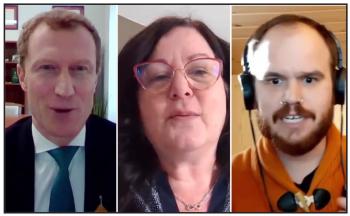Image Caption
Summary
Local Journalism Initiative Reporter
Windspeaker.com
In everything the commissioner for Indigenous languages does communities must be at the centre.
That is the conclusion that three break-out groups drew when discussing different aspects of the Office for the Commissioner of Indigenous Languages (OCIL) on the fourth day of an Indigenous Languages symposium hosted by Canadian Heritage.
“When it comes to research, we’ve got to realize that these (Indigenous) communities in many ways have been participating in their own research for many years, understanding … the language in their communities, how it’s impacting the well-being of their people,” said Henry Robertson, who facilitated a break-out session on the research, planning and results function of the OCIL.
“These are things that the community knows. They are a wealth of knowledge that can be tapped into, but it needs to be directed by these community members,” he said.
Many communities will say they have been the subject of too many research projects and don’t feel they have benefited, Robertson noted.
“The answer to this is not to forego research, but change the way in which research is done. Research when done right can bring language back to life.”
Community-level research must be led or co-led by Indigenous people, Robertson said.
As the OCIL’s mandate includes leadership and advocacy, the commissioner can use these aspects to establish best practices and methodologies before a community is approached on a research venture.
However, communities must have a right to refuse to be the focus of research, said Robertson.
Sharon Parenteau, executive director with the Louis Riel Institute, led a break out group on the awareness and promotion-focused functions of the OCIL. She too stressed the importance of supporting the community.
“We need to understand as Indigenous people in Canada that there’s a lot of racism and the commissioner is going to have to play some sort of a role in anti-racism and decolonization. But they also need to affirm to the Indigenous people that they are there to support them,” said Parenteau.
She also pointed out that the work of the commissioner had to be focused on language and not politics.
“The mandate has to really support community. It has to somehow bring people together, think about community, think about how we collectively plan,” said Mathieu Courchene, who facilitated the third break-out group, the focus of which was on the community-centred function of the OCIL.
He said the nation must collectively “think about how you want to fulfill those goals and desires and visions and then go seek the supports you need to achieve your goals.”
Much of what was said during the break-out sessions were an echo of the findings Paul Pelletier, director general, Indigenous Languages, Canadian Heritage, presented earlier in the day.
Twenty-six virtual consultations were held following the proclamation of the Indigenous Languages Act in June 2019.
Stakeholders—First Nations, Métis, Inuit and urban Indigenous peoples—shared their ideas and recommendations about the key roles and responsibilities of the office, as well as the early priorities. They also made recommendations on the qualities and qualifications of the commissioner and directors. Up to three directors are to be hired. Deadline for application for the positions was Jan. 25, the first day of the five-day Indigenous Languages symposium. However, Pelletier said applications would be monitored past that deadline to assure the best candidates are selected.
“What we heard repeatedly across the consultation sessions was that the starting point should really be about the office working with Indigenous communities and organizations to establish a baseline of the language vitality across Indigenous communities and working with communities on how to best measure results and progress,” said Pelletier.
During the consultations, the government also heard that stakeholders wanted to ensure that Canada was held accountable for the implementation of the Indigenous Languages Act.
That was a commitment Indigenous Services Canada Minister Marc Miller made to virtual symposium attendees as the day’s events began.
“I’m proud of the financial commitment our government has made, continues to make, with this initiative,” he said.
In the 2019 budget the Liberal government earmarked a starting amount of $333.7 million over five years along with $115.7 million to support the implementation of the act.
“To rebuild this cultural touchstone before it disappears altogether is essential reconciliation. That is the aim of the Indigenous Languages Act, to support the efforts of Indigenous peoples to revitalize, maintain, and strengthen their languages and to ensure these efforts have adequate, stable, and long-term funding,” said Miller.
Local Journalism Initiative Reporters are supported by a financial contribution made by the Government of Canada.

